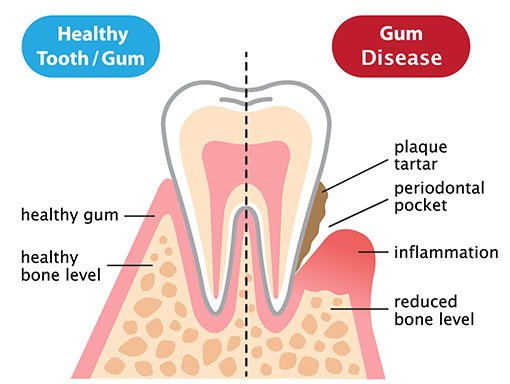Gum Disease Therapy
Why choose us for your dental care?

Gum Disease Therapy
Taking care of your gums is an essential part of your oral hygiene. Gum care starts at home, with a daily hygiene routine that includes flossing to clean below the gumline. Your dentist and hygienist will monitor the health of your gums and can recommend the best gum disease treatment options if they detect signs of inflammation or periodontal (gum) disease.
What is Periodontal (Gum) Disease?
Gum disease is a progressive disease that breaks down the gum tissue and bone surrounding your teeth. It is caused by bacteria in plaque and dental calculus. If left untreated, gum disease can lead to tooth loss and contribute to other systemic health problems, including diabetes, cardiovascular disease and dementia.
According to the Canadian Dental Association, 7 in 10 adults will experience gum disease in their lifetime. The good news is gum disease is preventable and can be reversed if it’s caught early enough.
Early Signs of Gum Disease (Gingivitis)
Signs of early gum disease, or gingivitis, include red, swollen gums. Your gums may also be tender or bleeding. It’s important to note that gum disease is often a silent disease – many people don’t notice any symptoms until it’s in its more advanced stages.
Symptoms of periodontal (gum) disease:
- Red, swollen or sore gums
- Receding gums
- Bad breath
- Pain when chewing
- Loose or sensitive teeth
You can treat gingivitis at home by eating a healthy diet, brushing your teeth at least twice a day and flossing daily. This will help reduce harmful bacteria in your mouth and give your gums a chance to recover.
Although you can brush away plaque, calculus (hardened plaque) can only be removed by your dental hygienist. Be sure to keep up with regular professional dental cleanings to keep hard-to-reach areas free of bacteria. Most people should get their teeth professionally cleaned at least every six months. Your hygienist may recommend more frequent cleanings depending on the condition of your teeth and gums.
If it’s been more than 6 months since your last professional cleaning, request an appointment today!
Ask Us a Question
Fill out the form below and one of our professional dental team members will get back to you as soon as possible.
"*" indicates required fields

Moderate to Advanced Gum Disease (Periodontitis)
As gum disease progresses into Periodontitis, inflammation and bleeding will become more noticeable. The bacteria starts breaking down the connective tissue in your gums, forming pockets of infection around affected teeth. You may notice your gums receding or even tooth movement due to bone loss. It is critical to get treatment as soon as possible if you are experiencing any of these symptoms.
To treat moderate gum disease, your hygienist can do scaling and root planing, a deep cleaning treatment that removes calculus from below the gumline. They may also apply an antimicrobial gel or recommend a medicated mouthwash to help reduce inflammation. For more advanced cases, your dentist may refer you to a gum specialist, or Periodontist.
Surgical Treatment for Gum Disease
If you have deep periodontal pockets, severe gum recession or exposed tooth roots, your dentist or Periodontist may recommend surgical treatments, such as pocket reduction surgery or a gum graft. These procedures work to restore your gum tissue and preserve the surrounding bone.
There are many ways to treat gum disease, but early intervention is key! If you are concerned about the health of your gums, contact us today for an appointment.
We’re Different!
Our job is to show you what we see in your mouth, educate you on your options, and let you make the best decision for yourself. We never push unnecessary treatments and always give you options.
Have a question or want to book an appointment?
Click on the button below to ask us a question, check your insurance, or request an appointment online.

